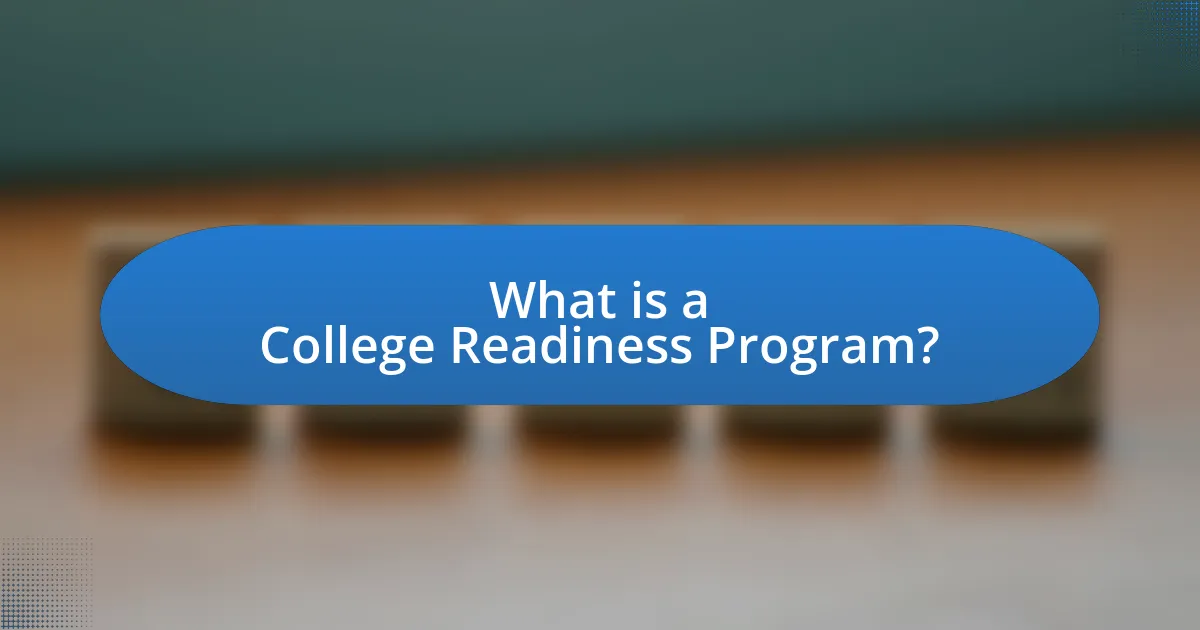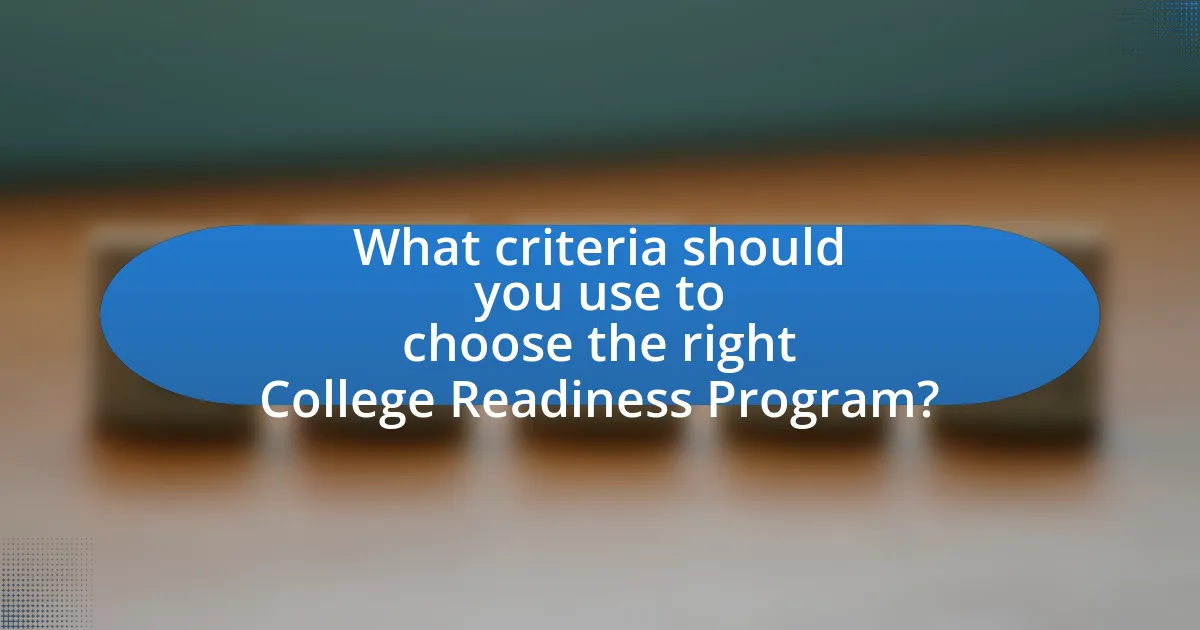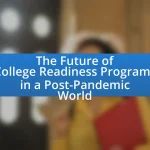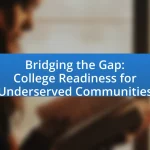A College Readiness Program is an educational initiative aimed at preparing high school students for the academic and social challenges of college. This article outlines the importance of these programs, highlighting their focus on critical skills such as time management, study habits, and subject-specific knowledge. It discusses the differences between College Readiness Programs and traditional education, key components of effective programs, and various types available, including academic preparation and test preparation courses. Additionally, the article provides guidance for parents on assessing their child’s needs, evaluating program quality, and avoiding common pitfalls in the selection process, ensuring that students are well-equipped for higher education success.

What is a College Readiness Program?
A College Readiness Program is an educational initiative designed to prepare high school students for the academic and social demands of college. These programs typically focus on enhancing skills in areas such as critical thinking, time management, study habits, and subject-specific knowledge, ensuring that students are equipped to succeed in a higher education environment. Research indicates that students who participate in such programs often demonstrate improved academic performance and higher college enrollment rates, as evidenced by studies from the National Center for Education Statistics, which show that structured preparation significantly impacts college readiness outcomes.
How do College Readiness Programs differ from traditional education?
College Readiness Programs differ from traditional education by focusing specifically on preparing students for the academic and social demands of college. Unlike traditional education, which often emphasizes a broad curriculum, College Readiness Programs provide targeted instruction in skills such as time management, study techniques, and critical thinking, which are essential for success in higher education. Research indicates that students who participate in these programs are more likely to enroll in college and persist through their studies, highlighting their effectiveness in bridging the gap between high school and college expectations.
What are the key components of a College Readiness Program?
A College Readiness Program typically includes academic preparation, skill development, and support services. Academic preparation focuses on enhancing students’ knowledge in core subjects such as math, reading, and writing, ensuring they meet college admission requirements. Skill development encompasses critical thinking, time management, and study strategies, which are essential for success in higher education. Support services often involve counseling, mentorship, and resources for college applications and financial aid, helping students navigate the transition to college effectively. These components collectively aim to equip students with the necessary tools and knowledge to succeed in a college environment.
Why are College Readiness Programs important for students?
College readiness programs are important for students because they equip them with essential skills and knowledge needed for academic success in higher education. These programs provide targeted instruction in areas such as study habits, time management, and critical thinking, which are crucial for navigating college-level coursework. Research indicates that students who participate in college readiness programs are more likely to enroll in college and persist through their studies, with studies showing a 20% increase in college enrollment rates among participants compared to non-participants.
What types of College Readiness Programs are available?
Various types of College Readiness Programs are available, including academic preparation programs, college access programs, and test preparation courses. Academic preparation programs focus on enhancing students’ skills in subjects like math, reading, and writing to meet college standards. College access programs aim to provide resources and support for underrepresented students, helping them navigate the college application process. Test preparation courses specifically prepare students for standardized tests such as the SAT or ACT, which are critical for college admissions. These programs are designed to equip students with the necessary skills and knowledge to succeed in higher education.
How do academic-focused programs compare to skill-building programs?
Academic-focused programs prioritize theoretical knowledge and critical thinking skills, while skill-building programs emphasize practical, hands-on experience and specific competencies. Academic programs often include structured curricula aimed at preparing students for higher education, covering subjects like mathematics, science, and literature, which are essential for academic success. In contrast, skill-building programs focus on developing abilities that are directly applicable in the workforce, such as coding, communication, and problem-solving skills. Research indicates that students who engage in skill-building programs often report higher levels of job readiness and employability, as these programs align closely with industry demands.
What role do online College Readiness Programs play?
Online College Readiness Programs play a crucial role in preparing students for the academic and social demands of college. These programs provide essential skills, such as time management, study techniques, and critical thinking, which are vital for success in higher education. Research indicates that students who participate in structured readiness programs are more likely to transition smoothly into college, as they develop a better understanding of college expectations and resources. For instance, a study by the National Center for Education Statistics found that students who engaged in college readiness initiatives had higher enrollment rates in postsecondary education compared to those who did not.
How can you assess your child’s needs for a College Readiness Program?
To assess your child’s needs for a College Readiness Program, begin by evaluating their academic performance, including grades and standardized test scores, to identify strengths and weaknesses. Additionally, consider their extracurricular involvement, study habits, and college aspirations, as these factors influence the type of support they may require. Research indicates that students who engage in targeted preparation programs often experience improved college readiness, as highlighted in studies by the National Center for Education Statistics, which show that structured support can enhance academic outcomes.
What factors should you consider when evaluating your child’s readiness?
When evaluating your child’s readiness for college, consider their academic performance, emotional maturity, and social skills. Academic performance includes grades, test scores, and mastery of essential subjects, which indicate their preparedness for college-level coursework. Emotional maturity involves their ability to handle stress, make decisions, and take responsibility for their actions, which are crucial for independent living. Social skills encompass their ability to communicate effectively, work in teams, and build relationships, all of which are important for success in a college environment. These factors collectively provide a comprehensive view of your child’s readiness for the challenges of higher education.
How do academic performance and learning styles influence program choice?
Academic performance and learning styles significantly influence program choice by guiding students toward options that align with their strengths and preferences. Students with high academic performance often select advanced or specialized programs that challenge them further, while those with lower performance may opt for foundational or remedial programs to build necessary skills. Additionally, learning styles, such as visual, auditory, or kinesthetic, affect how students engage with content, leading them to choose programs that incorporate their preferred methods of learning. Research indicates that students who align their program choices with their learning styles tend to achieve better outcomes, as they are more engaged and motivated in their studies. For instance, a study published in the “Journal of Educational Psychology” found that students who matched their learning preferences with instructional methods performed significantly better academically.
What personal interests and career goals should be taken into account?
Personal interests and career goals that should be taken into account include the child’s passions, strengths, and aspirations for their future profession. Identifying these elements helps tailor a college readiness program that aligns with the child’s unique profile. For instance, if a child shows a strong interest in science and technology, a program emphasizing STEM education would be beneficial. Research indicates that students who engage in programs aligned with their interests are more likely to succeed academically and pursue relevant careers, as evidenced by a study from the National Center for Education Statistics, which found that students with clear career goals are more likely to complete their degrees.
How can you involve your child in the decision-making process?
Involve your child in the decision-making process by encouraging them to express their preferences and opinions regarding college readiness programs. This can be achieved through discussions where you ask open-ended questions about their interests, goals, and what they hope to gain from such programs. Research indicates that children who participate in decision-making develop better critical thinking skills and a sense of ownership over their choices, which can lead to more successful outcomes in their educational journey.
What questions should you ask your child about their college aspirations?
To understand your child’s college aspirations, ask them about their preferred fields of study, potential career goals, and the type of college environment they envision. Inquire about their academic strengths and interests, as well as any extracurricular activities they wish to pursue. Additionally, discuss their thoughts on location, size of the college, and financial considerations. These questions help gauge their readiness and preferences, which are crucial for selecting an appropriate college readiness program. Engaging in this dialogue can provide insights into their motivations and help align their aspirations with suitable educational pathways.
How can you encourage your child to express their preferences?
Encouraging your child to express their preferences can be achieved by creating an open and supportive environment where they feel safe to share their thoughts. Engaging in regular conversations about their likes and dislikes, asking open-ended questions, and actively listening to their responses fosters a sense of validation and encourages them to articulate their preferences. Research indicates that children who feel heard are more likely to express their opinions confidently, which is crucial for their decision-making skills in contexts like choosing a college readiness program.

What criteria should you use to choose the right College Readiness Program?
To choose the right College Readiness Program, evaluate the program’s curriculum, support services, and success rates. A comprehensive curriculum should cover essential academic skills, college application processes, and financial literacy. Support services, such as tutoring and counseling, enhance student readiness by providing personalized assistance. Success rates, including college enrollment and retention statistics, serve as indicators of the program’s effectiveness. Programs with proven track records in these areas are more likely to prepare students successfully for college.
How do you evaluate the quality of a College Readiness Program?
To evaluate the quality of a College Readiness Program, assess its curriculum, support services, and outcomes. A strong program should offer a comprehensive curriculum that aligns with college expectations, including advanced coursework and skill development in critical thinking, writing, and mathematics. Additionally, effective support services such as academic advising, tutoring, and college application assistance are essential for student success. Finally, analyze the program’s outcomes, including college enrollment rates, student retention, and feedback from alumni, to determine its effectiveness. Programs with high success rates and positive testimonials from participants typically indicate quality and reliability.
What qualifications should instructors have in these programs?
Instructors in college readiness programs should possess advanced degrees in education or a related field, along with experience in teaching or counseling. These qualifications ensure that instructors have a strong foundational knowledge of educational practices and the college admissions process. Additionally, certifications in college counseling or specialized training in college readiness can enhance their effectiveness. Research indicates that instructors with these qualifications are better equipped to guide students through the complexities of preparing for higher education, as they can provide informed advice and support tailored to individual student needs.
How can you assess the program’s success rates and outcomes?
To assess a college readiness program’s success rates and outcomes, analyze metrics such as graduation rates, college enrollment rates, and standardized test scores of participants. These metrics provide quantifiable evidence of the program’s effectiveness in preparing students for higher education. For instance, a program that reports a 90% graduation rate and an 85% college enrollment rate indicates strong performance. Additionally, reviewing testimonials and case studies from former participants can offer qualitative insights into the program’s impact on student readiness.
What resources are available to help you make an informed choice?
Resources available to help you make an informed choice about college readiness programs include official educational websites, program reviews, and parent testimonials. Official educational websites, such as the U.S. Department of Education, provide guidelines and standards for college readiness programs, ensuring that parents have access to credible information. Program reviews from independent sources, like GreatSchools or Niche, offer insights into the effectiveness and reputation of various programs based on user feedback and performance metrics. Additionally, parent testimonials can provide real-world experiences and outcomes, helping to gauge the suitability of a program for a child’s specific needs. These resources collectively empower parents to make well-informed decisions regarding their child’s college readiness.
How can you utilize online reviews and testimonials effectively?
To utilize online reviews and testimonials effectively, parents should actively seek and analyze feedback from other families regarding college readiness programs. This involves reading multiple reviews across various platforms to identify common themes, strengths, and weaknesses of the programs. Research indicates that 84% of people trust online reviews as much as personal recommendations, highlighting their influence on decision-making. By comparing testimonials, parents can gauge the effectiveness of programs in preparing students for college, ensuring they choose a program that aligns with their child’s needs and expectations.
What role do school counselors play in guiding your decision?
School counselors play a crucial role in guiding decisions related to college readiness programs for students. They provide personalized advice based on students’ academic performance, interests, and career aspirations, helping families navigate the complexities of selecting appropriate programs. Research indicates that students who engage with school counselors are more likely to enroll in college and persist in their studies, as counselors offer insights into program requirements, application processes, and financial aid options. This support is essential in ensuring that students make informed choices that align with their long-term educational and career goals.
What are some common pitfalls to avoid when selecting a program?
Common pitfalls to avoid when selecting a college readiness program include failing to assess the program’s alignment with your child’s specific needs, overlooking the qualifications and experience of the instructors, and neglecting to consider the program’s track record of success. Assessing alignment ensures that the program addresses your child’s academic strengths and weaknesses, which is crucial for effective learning. Instructors with relevant qualifications and experience significantly impact the quality of education, as studies show that teacher effectiveness correlates with student outcomes. Additionally, reviewing the program’s success rates, such as college acceptance rates or student testimonials, provides insight into its effectiveness and can guide informed decision-making.
How can you prevent being swayed by marketing tactics?
To prevent being swayed by marketing tactics, individuals should critically evaluate the information presented and seek independent reviews. Research indicates that consumers who analyze marketing claims and compare them with unbiased sources are less likely to be influenced by persuasive advertising techniques. For instance, a study published in the Journal of Consumer Research found that consumers who engaged in critical thinking were more adept at identifying misleading marketing messages. By prioritizing objective assessments over emotional responses, individuals can make informed decisions that align with their true needs and values.
What should you watch out for in terms of program costs and hidden fees?
When evaluating college readiness programs, it is crucial to watch out for additional costs and hidden fees that may not be immediately apparent. These can include registration fees, materials costs, and charges for supplemental services such as tutoring or test preparation. According to a report by the National Center for Education Statistics, nearly 30% of families encounter unexpected expenses related to educational programs, which can significantly impact overall budgeting. Therefore, it is essential to thoroughly review the program’s fee structure and ask for a detailed breakdown of all potential costs before enrollment.
What are the best practices for ensuring your child benefits from the chosen program?
To ensure your child benefits from the chosen college readiness program, actively engage in their learning process. This includes regularly communicating with program instructors to understand the curriculum and your child’s progress. Research indicates that parental involvement significantly enhances student outcomes; for instance, a study by the National Center for Family & Community Connections with Schools found that students with engaged parents are more likely to achieve higher grades and test scores. Additionally, encourage your child to set specific goals related to the program, as goal-setting has been shown to improve motivation and performance. Regularly review and discuss these goals with your child to maintain focus and accountability.


